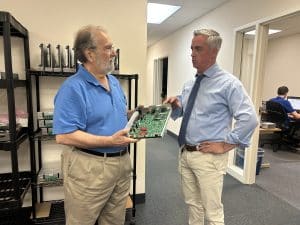State Representative Greg Vitali (D-166) introduced House Bill 1476 in June to address environmental concerns associated with crypto asset mining facilities in Pennsylvania.
The proposed law would create reporting requirements for data mines, provide for an environmental study and create a two-year moratorium for new or renewed licenses to operate crypto mining facilities.
Pushback from members of the House Environmental Resources and Energy Committee, which is chaired by Vitale, forced the lawmaker to amend the bill if he wanted any portion of it to move forward. After removing the two-year moratorium clause, the bill cleared committee by one vote, only to be laid on the table in the House.
“I think I learned the hard way in my first six months as majority chair that there’s not a high tolerance for strong environmental policy … even in my own caucus,” Vitali said in an article by Pennsylvania Capital-Star.
Crypto mining isn’t mining in the traditional sense. It is the mining of vast amounts of data that increases CO2 emissions due to the extraordinary amount of electricity required to run countless computer servers.
Vitale told CoinDesk that crypto mining uses massive quantities of power. “Globally crypto mining consumes more energy than the countries of Argentina and Australia,” he said. “This high level of energy usage places more stress on the environment and accelerates the climate crisis, in addition to raising costs for consumers.”
Simplified, data miners attempt to solve highly sophisticated mathematical equations in exchange for cryptocurrency that may be traded or sold on the crypto exchange. This process can be quite lucrative with the current value of a single Bitcoin, one form of digital currency, valued at approximately $29,500.
“It’s becoming clear that the crypto mining industry, which has exploded in recent years in the U.S., is energy-intensive and operating with little government oversight,” wrote Vitale and Charles McPhedran, Senior Attorney of Earthjustice’s Clean Energy Program in a Philadelphia Inquirer Op-ed.
McPhedran and Vitale also said that “the industry has made its way into Pennsylvania … burning fossil fuels to power their machines.” Roughly 5,000 abandoned coal mines exist in Pennsylvania and mountains of coal refuse are being burned to generate energy by crypto miners even though it increases carbon emissions.
The majority of electricity used to power crypto mining is derived from the burning of coal or fracked gas, but there is one mine that runs on other energy sources including nuclear, hydro, and solar.
Terawulf’s Nautilus virtual coin mining facility, located near Berwick in Columbia County, boasts that its energy sources are 90% zero-carbon energy, with a goal to be 100% zero-carbon by 2030.
The concept of “green” crypto mining has drawn interest from a variety of investors, including those of celebrity status including Gwyneth Paltrow, Mindy Kaling, Sara Foster and Lilly Singh, according to Market Values.
“Technically, nuclear produces zero carbon emissions. But it uses massive amounts of water to operate and creates dangerous radioactive waste,” said the Environmental Working Group.
Nuclear debris is hazardous to humans and animals and is believed to remain radioactive for thousands of years.
Pennsylvania also began offering tax credits in 2016 to companies looking to launch data centers to store online information, but this credit has been exploited by crypto miners.
“The cost of the program is expected to grow from $5 million in 2021 to almost $90 million by 2027,” reported Stephen Caruso for Pennsylvania Capital-Star.
The environmental damage, coupled with the massive tax credits, make it very difficult to believe that Pennsylvanians will reap benefits from crypto currency mining any time soon.






